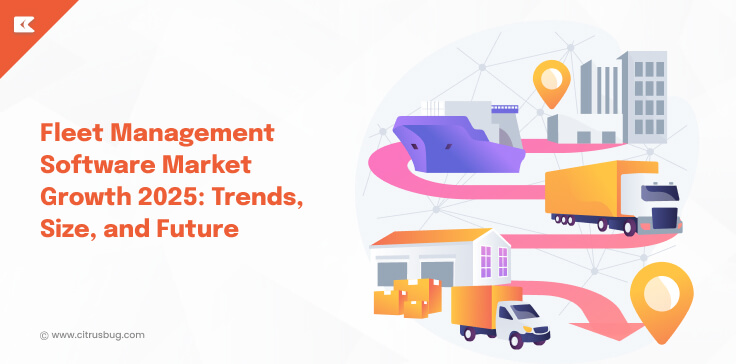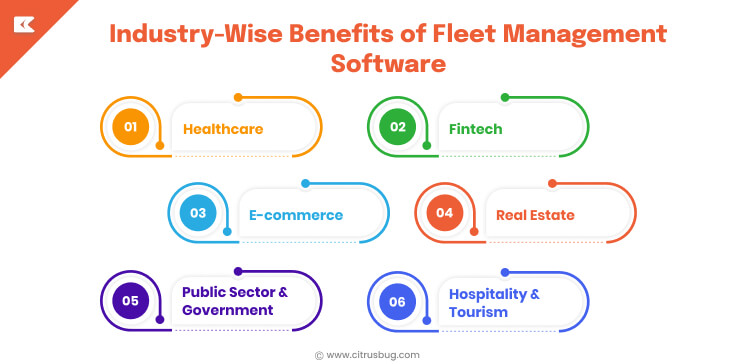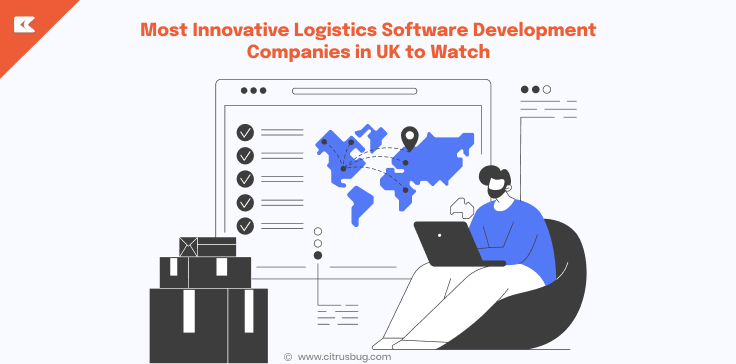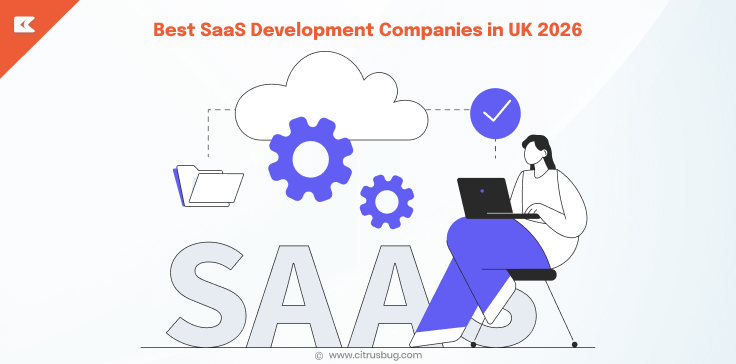Fleet Management Software Market Growth 2025: Trends, Size, and Future
- September 26, 2025
-
1012 Views
- by Ishan Vyas
Table of Contents

Fleet management software market is growing at a fast pace because of increasing global demand for optimized logistics and operational efficiency. Companies across the globe are implementing these solutions to optimize their logistics, flexibility in costs, and improve safety measures.
In this blog, we discuss the major functions and features, emerging trends, and the future of the fleet management software market.
What is Fleet Management Software?
The fleet management software is a digital platform that helps companies to manage all aspects of fleet operations throughout the entire life cycle of the fleet. There is data centralization and process automation for operations, maintenance, compliance, and driver management of that particular fleet.
It collects data using GPS, telematics, and sensors from the vehicles, processes that data, and turns it into useful knowledge presented to the fleet managers through dashboards and reports, who can use that information to optimize routes, reduce downtime, and improve asset utilization.
Fleet Management Software Market Growth
Analysts value the global fleet management software market at $27.55 billion in 2024 and project its expansion up to $116.56 billion by 2032 at an expected compound annual growth rate (CAGR) of 19.8%.
Emerging Trends in Fleet Management Software
Several transformative trends have molded the fleet management software market landscape in 2025. AI and ML integration is the game-changer. It offers predictive analytics about equipment maintenance, route optimization, and fuel consumption. These help operators to find the issue before it even occurs, thus massively reducing downtime and operating costs.
The second is Electric vehicle (EV) fleet management. It has taken the world by storm, with specialized software features addressing charging infrastructure, battery monitoring, and range optimization.
The global EV fleet management software market size was estimated at $1.5 billion in 2023 and is projected to reach $5.8 billion by 2032, growing at a CAGR of 16.3% during the forecast period.
As governments worldwide implement stricter emission regulations, fleet operators are rapidly transitioning to electric vehicles, driving demand for EV-specific management solutions.
The other trend is a mobile-first approach and ADAS systems integrations. Real-time communications, driver scorecards, and gamification elements add the driver engagement and safety compliance aspects to build more complete fleet management ecosystems.
Key Drivers of Market Growth in 2025
- Rising fuel costs push adoption by optimizing routes and reducing consumption.
- Legal requirements such as ELD and tachograph rules are the reasons why companies put fleets on the software.
- Development of e-commerce and last-mile delivery has increased demand for real-time tracking.
- Operational efficiency and cost reduction are driving businesses to automate fleet management systems.
- Technological advancements in AI, telematics, IoT, and cloud enhance adoption.
- Sustainability and EV adoption motivate investment in fleet management software.
- As driver safety and monitoring become a higher priority, fleet software integration becomes even more critical.
- Expansion in the logistics and transportation sectors drives global market expansion.
- Globalization and supply chain complexity encourage the adoption of centralized fleet management.
- Mobile access and remote management capabilities drive adoption among SMEs.
- Growing awareness of data-driven decision-making enhances fleet software utilization.
Regional Analysis of Market Growth
| Region | Market Share | CAGR (2025-2030) | Market Value | Key Growth Drivers |
| North America | 36% | 20.21% | $5.52 billion | Mature infrastructure, enterprise adoption, and regulatory compliance |
| Europe | 28% | 11.9% | $8.06 billion | Environmental regulations, sustainability initiatives, and EV adoption |
| Asia-Pacific | 22% | 15.4% | $5.3 billion | Rapid digitization, industrial growth, and smart city projects |
| Middle East & Africa | 8% | 8.6% | $1.9 billion | Infrastructure development, logistics expansion |
| Latin America | 6% | 15% | $8.3 million | Economic growth, transportation modernization |
The global fleet management software market demonstrates strong regional variations in growth. North America leads with a 36% fueled by regulatory compliance and enterprise adoption.
Europe holds the second biggest market share at 28%, driven by sustainability goals and the rising adoption of electric vehicles.
Asia-Pacific is rapidly developing with a CAGR of 15.4% due to regional industrial development as well as smart city initiatives.
Middle East/Africa and Latin America are developing markets, with growth drivers being infrastructure development, economic improvement, and modernization of transport.
How Fleet Management Software Enhances Operational Efficiency?
Fleet management software considerably aids workflow by automating day-to-day processes and by giving real-time insights into fleet operations. Through GPS tracking and telematics, managers can monitor vehicle location, driver behavior, and fuel consumption, all of which provide better options for route planning and evidently reduce travel times.
Predictive maintenance enables fleet managers to prepare vehicle servicing beforehand, thus preventing any potential issues and extending the lifespan of the vehicle. It also undertakes automated reporting and analytics to keep track of the key metrics and allocate resources efficiently.
By offering remote access, cloud-based platforms raise efficiency, allowing managers to keep an eye on operations from any location and respond instantly whenever an issue occurs. Services from these platforms, combined with AI and IoT-based technologies, take one step higher in decision-making, load optimization, and safety monitoring.
By combining these capabilities, fleet management software makes sure that operations run smoothly, keeping expenses under control and utilizing assets efficiently.
Industry-Wise Benefits of Fleet Management Software
Fleet management software is not limited to logistics. It is used across industries for the purpose of boosting efficiency, reducing costs, and ensuring legal compliance. Each sector has specific needs, and by fulfilling these needs, fleet management solutions help in promoting their businesses, which in turn leads to the global expansion of this market.
Healthcare
Fleet management software ensures reliable ambulance dispatch, delivery of medical supplies, and timely transport of patients. Real-time vehicle tracking improves responses to emergency situations while predictive maintenance reduces equipment downtime.
With healthcare systems worldwide going through digital transformation, fleet solutions have become an important element for ensuring service reliability and patient safety and, thus, driving the growth of the market in this vital sector.
Fintech
Fintech companies rely on secure and transparent transport of currency, assets and sensitive documents for safe transfer between locations. Advanced GPS tracking and driver monitoring reduce risks while compliance features ensure strict financial regulations are adhered to. With Fintech expanding across markets worldwide, demand has grown for secure, transparent fleets.
E-commerce
The booming e-commerce sector is a major driver of the fleet management software market. For long-distance deliveries, this fleet management software is a game-changer. It optimizes the travel route for timely and cost-effective deliveries.
It offers real-time tracking to customers, adding transparency and satisfaction. Through driver performance monitoring, it keeps fuel expenses low and the efficiency of deliveries high, which are vital for sustaining tight profit margins in this competitive business.
Real Estate
The real estate sector uses fleet management software to automate certain processes associated with actual property management, maintenance, and viewings. This also allows the managers to effectively deploy maintenance teams to different properties while optimizing their routes and schedules.
The software also provides location visibility of vehicles and equipment to ensure tools and staff are where they should be. As a result, tools can be better deployed, maintenance teams can respond more quickly, and customers can be better served.
Public Sector & Government
The Fleet Management Software is revolutionizing the way public sector and government organizations manage essential vehicles, from police cars to fire trucks, postal delivery fleet to municipal service vehicles. These operations demand high efficiency, accountability, and safety, making digital solutions essential.
By using GPS tracking, telematics, or data-driven dashboards, government agencies can track vehicle usage, assign vehicles to routes of optimal length, and schedule vehicle downtime for predictive maintenance. This reduces operational costs while providing uninterrupted services for the greater good of humanity.
Compliance certainly is a dominant motivational force. The fleet management solutions ensure public fleets conform to regulations, safety requirements, and sustainability mandates. This transparency and centralization help to build the good will of taxpayers who can see their resources being managed frankly.
Hospitality & Tourism
The hospitality and tourism sector is helped by fleet management solutions to establish smooth operations in shuttles, guest transportation, and rental car operations. Real-time tracking, optimized routes, and mobile-first booking apps are some of the features that enable companies to have a good customer experience.
The other capabilities offered by the software are ensuring driver safety, on-time pickups, and optimal utilization of vehicles, such capabilities are essential in delivering an exceptional guest experience. With tourism gathering momentum globally, the adoption of fleet management solutions has been a differentiator for a competitive edge.
Role of Technology in Transforming Fleet Operations
Technology is not only making the fleets more efficient; it is also changing the whole ecosystem to work on a very different paradigm. Fleet management software has now become a multidisciplinary technology platform utilizing artificial intelligence (AI), machine learning (ML), the internet of things (IoT), 5G connectivity, and cloud computing. These new technologies are not only altering the very decision-making and compliance process but also long-term sustainability strategies.
AI and ML create much better predictions, from demand surges to automatic driver scheduling. Through data-informed insight, fleet managers now have the power to proactively solve problems that in the past, they used to respond passively. The connectivity provided by IoT and 5G also establishes a network of vehicles, sensors, and devices constituting the real-time operation at the large scale, into global supply chains.
Another major transformation is the integration of electric vehicle (EV) and hybrid fleets. Software is now facilitating charging station mapping, battery analysis, and carbon tracking to allow organizations to prepare for future global sustainability regulations. Similarly, advanced driver assistance systems (ADAS) and semi-autonomous functions are being integrated to increase the standard for safety and to prepare fleets for a transition to autonomous transport.
Cloud-based systems and mobile-centric applications go one step further with everywhere access to fleet data, global-spanning collaboration, and distributed fleet support.
Ultimately, it’s doing more than merely simplifying their fleet operations; it’s remaking their future, opening up possibilities to cleaner, safer, and smarter transport systems aligned with international business as much as environmental objectives.
Future of Fleet Management Software
The fleet management software market is poised for significant transformation beyond operational efficiency, with its future shaped by evolving business needs, global regulations, and customer expectations. Key future directions include:
- Global Adoption Acceleration: Adoption will scale down from large enterprises to SMB needs in connection with inexpensive cloud-based solutions and scalable subscription models.
- Integration with Supply Chains: Fleet management will move beyond classical vehicle-based set-up and interface with logistics platform, warehouses, and even customer side to create a unified supply-chain ecosystem.
- Regulatory Implications: Stricter environmental regulations, safety compliance, and data privacy laws will force businesses to implement the most cutting-edge compliance features; in other words, it is regulatory preparedness that forms the core of the software.
- Sustainability as the Priority: The software of tomorrow will help the world measure, report carbon emissions, manage EV charging, and work toward ESG goals; in doing so, it will have sustainability as a competitive advantage.
- Evolution of Business Model: Subscription-based services and Mobility-as-a-Service (MaaS) models will be the true kings, offering cheap access to advanced features without a big upfront investment.
- Customer-Centric Services: Increased expectations for real-time delivery tracking, predictable ETA, and transparent communication will be driving software providers to offer better tools related to customer engagement.
- Data Monetization & Partnerships: Fleet data will emerge as an asset of great value, with fleets entering into partnerships with insurers, fuel providers, and smart city projects to share the mutual benefits.
Fleet management software will evolve not just technologically but also through changing business models, compliance, and sustainability, paving the way for shipping ecosystems that are smarter, sustainable, and customer-centric.
Conclusion
Fleet management software is a high-energy industry that is transforming into a center for operational effectiveness, protection, as well as spend management for several sectors. From logistics to the healthcare sector and e-commerce to the public sectors, industry players utilize intelligent solutions that boost production as well as ensure a satisfactory customer experience.
By aligning with AI, IoT, and cloud solutions, businesses can access efficiency, compliance, and sustainability with cost reduction guaranteed and higher customer satisfaction.
Partnering with an expert fleet management software development company helps to build industry-specific software tailored to regulatory needs, to prepare themselves for long-term growth in a highly competitive and technically advanced global market.





 SaaS Development
SaaS Development Web Application Development
Web Application Development Mobile Application Development
Mobile Application Development Custom Software Development
Custom Software Development Cloud Development
Cloud Development DevOps Development
DevOps Development MVP Development
MVP Development Digital Product Development
Digital Product Development Hire Chatbot Developers
Hire Chatbot Developers Hire Python Developers
Hire Python Developers Hire Django Developers
Hire Django Developers Hire ReactJS Developers
Hire ReactJS Developers Hire AngularJS Developers
Hire AngularJS Developers Hire VueJS Developers
Hire VueJS Developers Hire Full Stack Developers
Hire Full Stack Developers Hire Back End Developers
Hire Back End Developers Hire Front End Developers
Hire Front End Developers AI Healthcare Software Development & Consulting
AI Healthcare Software Development & Consulting Healthcare App Development
Healthcare App Development EHR Software Development
EHR Software Development Healthcare AI Chatbot Development
Healthcare AI Chatbot Development Telemedicine App Development Company
Telemedicine App Development Company Medical Billing Software Development
Medical Billing Software Development Fitness App Development
Fitness App Development RPM Software Development
RPM Software Development Medicine Delivery App Development
Medicine Delivery App Development Medical Device Software Development
Medical Device Software Development Patient Engagement Software Solutions
Patient Engagement Software Solutions Mental Health App Development
Mental Health App Development Healthcare IT Consulting
Healthcare IT Consulting Healthcare CRM Software Development
Healthcare CRM Software Development Healthcare IT Managed Services
Healthcare IT Managed Services Healthcare Software Testing services
Healthcare Software Testing services Medical Practice Management Software
Medical Practice Management Software Outsourcing Healthcare IT Services
Outsourcing Healthcare IT Services IoT Solutions for Healthcare
IoT Solutions for Healthcare Medical Image Analysis Software Development Services
Medical Image Analysis Software Development Services Lending Software Development Services
Lending Software Development Services Payment Gateway Software Development
Payment Gateway Software Development Accounting Software Development
Accounting Software Development AI-Driven Banking App Development
AI-Driven Banking App Development Insurance Software Development
Insurance Software Development Finance Software Development
Finance Software Development Loan Management Software Development
Loan Management Software Development Decentralized Finance Development Services
Decentralized Finance Development Services eWallet App Development
eWallet App Development Payment App Development
Payment App Development Money Transfer App Development
Money Transfer App Development Mortgage Software Development
Mortgage Software Development Insurance Fraud Detection Software Development
Insurance Fraud Detection Software Development Wealth Management Software Development
Wealth Management Software Development Cryptocurrency Exchange Platform Development
Cryptocurrency Exchange Platform Development Neobank App Development
Neobank App Development Stock Trading App Development
Stock Trading App Development AML software Development
AML software Development Web3 Wallet Development
Web3 Wallet Development Robo-Advisor App Development
Robo-Advisor App Development Supply Chain Management Software Development
Supply Chain Management Software Development Fleet Management Software Development
Fleet Management Software Development Warehouse Management Software Development
Warehouse Management Software Development LMS Development
LMS Development Education App Development
Education App Development Inventory Management Software Development
Inventory Management Software Development Property Management Software Development
Property Management Software Development Real Estate CRM Software Development
Real Estate CRM Software Development Real Estate Document Management Software
Real Estate Document Management Software Construction App Development
Construction App Development Construction ERP Software Development
Construction ERP Software Development







